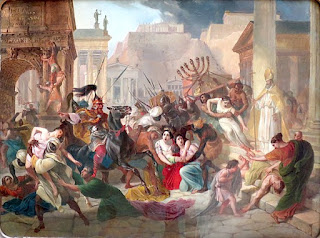His election involved an "antipope situation." An archdeacon named Eulalius was recognized as pope by the emperor prior to Celestine's election, but once the proper election took place, no arguments ensued.
In the decade while he sat the Throne of Peter, he had to deal with various questions of proper doctrine and fighting heresy. Fighting Pelagianism was an ongoing concern. He sent Palladius to the Scots of Ireland to deal with heresy, according to Prosper of Aquitaine. He may also have been the reason for St. Patrick's mission. Four letters from Celestine, all dated 15 March 431, went to African bishops urging them to fight against Nestorianism. Closer to home, the Roman Novatians denied the opportunity for any lapsed Christians to be re-welcomed into the faith. Celestine confiscated Novatian churches, arguing that reconciliation should never be refused to one who truly wants it.
The Gallic monk St. Vincent of Lerins in 434 explained Celestine's policy as a strict adherence to the tradition of his predecessors:
Holy Pope Celestine also expresses himself in like manner and to the same effect. For in the Epistle which he wrote to the priests of Gaul, charging them with connivance with error, in that by their silence they failed in their duty to the ancient faith, and allowed profane novelties to spring up, he says: "We are deservedly to blame if we encourage error by silence. Therefore rebuke these people. Restrain their liberty of preaching."
He had a long-distance relationship with Augustine, Bishop of Hippo in North Africa. Augustine was aware of him prior to his election, calling him "My Venerable Lord and Highly Esteemed and Holy Brother" in a letter of 418. Augustine wrote to him again shortly after he became pope with an unusual problem: his own mistake:
I am so racked with anxiety and grief that I think of retiring from the responsibilities of the episcopal office, and abandoning myself to demonstrations of sorrow corresponding to the greatness of my error.
What was the error? Augustine had recommended Antony of Fessula to become the bishop of that town, and now recognized that Antony was corrupt. Augustine wanted the new pope to help him deal with the problem.
Augustine's was one of the strongest voices against Pelagianism, and sent Prosper of Aquitaine (one of his most fervent disciples) to Rome to deliver his arguments to Celestine in a way that they could not easily be done by letters. This changed Prosper's career, since he stayed in Rome working for the papacy as Augustine's "man on the inside" to make sure the anti-Pelagian stance stayed foremost in papal policy. When Augustine died during the Siege of Hippo Regius by the Vandals, Celestine forbade attacks on Augustine's memory that were being made by the Semipelagians, who stated that humans could reach salvation through the choice of Free Will, as opposed to Augustine's teaching that God's Grace was necessary and predestination meant the conclusion was foregone. Semipelagianism was on the rise due to the works of John Cassian.
The early Church generated a lot of different ideas about how salvation was to be achieved and how the relationship between Good and Evil worked. For future reference, let's take a look at the major "heresies" (quotation marks because they simply failed to become official doctrine, but who knows what might have happened?) next time, and we'll talk about Vincent of Lerins who did his best to distinguish between Catholic doctrine and heresy.


